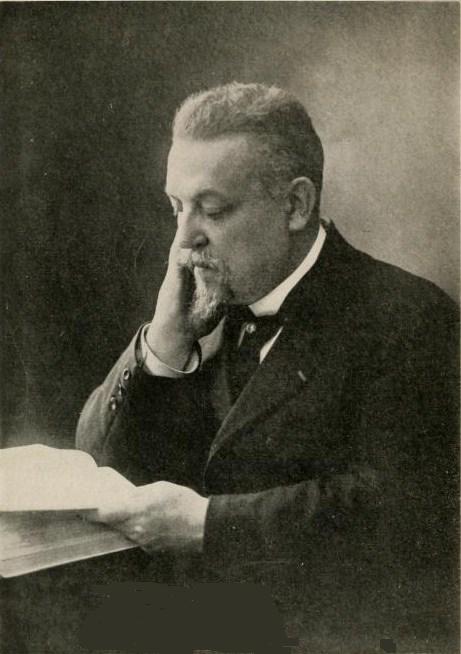1. Overview

Émile Boirac (Émile BoiracFrench, August 26, 1851 - September 20, 1917) was a prominent French philosopher, parapsychologist, and a dedicated promoter of the international auxiliary language Esperanto. He is widely recognized for being one of the first to introduce the term "déjà vu" into psychological discourse in 1876. Boirac's multifaceted career spanned academia, where he served as president of two major French universities, and extensive research into psychic phenomena, including animal magnetism and various hypnotic states. His contributions also extended to the Esperanto movement, where he played a pivotal role in its early development and standardization.
2. Biography
Émile Boirac's life was marked by significant academic achievements and a diverse range of intellectual pursuits, from his early life in Algeria to his prominent roles in French universities and his pioneering work in psychology and parapsychology.
2.1. Birth and Early Life
Émile Boirac was born on August 26, 1851, in Guelma, a city located in Algeria, which was then under French rule. Details of his very early life and upbringing are not extensively documented in available sources.
2.2. Education
While specific details regarding Émile Boirac's foundational educational background and academic training are limited in the provided sources, his later career trajectory as a philosopher and university president indicates a robust and comprehensive academic preparation.
2.3. Academic Career
Boirac held significant leadership positions within the French academic system. In 1898, he was appointed president of the University of Grenoble. He later moved to Dijon, where he became president of Dijon University in 1902, a position he held until his death. These roles highlight his standing and influence within the French educational establishment.
3. Major Activities and Contributions
Boirac's contributions spanned several distinct fields, from coining psychological terms to leading international linguistic movements and investigating psychic phenomena.
3.1. Philosophy and Psychology
Boirac made notable contributions to the lexicon of philosophy and psychology. He is credited with being one of the first to use the term "déjà vuFrench", which translates to "already seen," to describe the phenomenon of feeling as though one has previously experienced a situation or event that is actually new. This term first appeared in a letter he wrote to the editor of the *Revue philosophique* in 1876. He later elaborated on this concept in his book L'Avenir des Sciences Psychiques. In the same work, Boirac also proposed the term "metagnomyFrench", which he defined as "knowledge of things situated beyond those we can normally know." He introduced this term as a more precise description for what was commonly known at the time as clairvoyance.
3.2. Parapsychology Research
Boirac was deeply involved in the study of parapsychology and psychic phenomena, an area of significant scientific and public interest during his time. He was part of a group of researchers who conducted experiments on the renowned Italian medium Eusapia Palladino. Beyond his work with Palladino, Boirac also investigated various other psychic phenomena. His research included studies on animal magnetism and a range of hypnotic states, such as the induction of sleep, "transposition of senses," "magnetic rapport," "exteriorisation of sensitiveness," and "exteriorisation of motor nerve force." These investigations were detailed in his work "La psychologie inconnue," published in 1917.
3.3. Esperanto Movement
Émile Boirac was a dedicated advocate for Esperanto, the most widely spoken constructed international auxiliary language. His commitment to the language was evident in his leadership roles within the movement. He notably presided over the 1st Universal Congress of Esperanto, which took place in Boulogne-Sur-Mer, France, from August 7 to August 12, 1905. Furthermore, he served as the director of the Academy of Esperanto, an independent linguistic institution that preserves and develops the Esperanto language.
4. Writings
Émile Boirac's published works reflect his diverse intellectual interests, encompassing parapsychology, philosophy, education, and the Esperanto language.
4.1. Parapsychology Books
Boirac authored several influential books on parapsychology, documenting his research and theories on psychic phenomena:
- [https://archive.org/details/ourhiddenforcesl00boirrich Our hidden forces ("La psychologie inconnue") An experimental study of the psychic sciences] (New York, Frederick A. Stokes company, 1917)
- [https://archive.org/details/psychologyoffutu00boiruoft The psychology of the future ("L'avenir des sciences psychiques")] (London, Paul, 1918)
4.2. Philosophy and Education Books
His contributions to philosophy and educational psychology include:
- [https://archive.org/details/oeuvresphilosop01boirgoog Oeuvres philosophiques de Leibniz Volume 1] (F. Alcan, 1900)
- [https://archive.org/details/oeuvresphilosop00boirgoog Oeuvres philosophiques de Leibniz Volume 2] (F. Alcan, 1900)
- Boirac, Emile, & Magendie, A. [https://archive.org/stream/leonsdepsychol00boir#page/n7/mode/2up Leçons de psychologie appliquée à l'éducation] (Paris, F. Alcan, 1902)
- Fouillée, Alfred & Boirac, E. [https://archive.org/details/esquisseduneinte00foui Esquisse d'une interpretation du monde: d'après les manuscrits de l'auteur] (Paris: F. Alcan, 1913)
4.3. Esperanto Books
Boirac's dedication to Esperanto is evident in his numerous works related to the language, including translations and foundational linguistic texts:
- Translation to Esperanto of Leibniz's Monodalogy (1902)
- Ŝlosileto kvarlingva (1903)
- Perdita kaj retrovita (1905)
- Qu'est-ce que l'espéranto? (1906)
- Le Congrès espérantiste de Genève (1906)
- Pri la homa radiado (1906)
- Translation to Esperanto of Molière's Don Juan (1909)
- Translation to Esperanto of Henry van Dyke's The Other Wise Man (1909)
- Plena Vortaro E-E-a (1909)
- Le problème de la langue internationale (1911)
- Vortaro de la Oficialaj Radikoj (1911)
- Fundamentaj principoj de la vortaro esperanta (1911)
5. Death
Émile Boirac passed away on September 20, 1917, in Dijon, France, at the age of 66.
6. Impact and Evaluation
Émile Boirac's legacy is characterized by his significant contributions across diverse fields. His introduction of the term "déjà vu" has had a lasting impact on the field of psychology, becoming a widely recognized concept. His extensive research into parapsychology, while a subject of ongoing debate, positioned him as a notable figure in the early scientific investigation of psychic phenomena. Furthermore, his leadership and literary contributions to the Esperanto movement were crucial in its early establishment and popularization as an international language. Boirac's work reflects a broad intellectual curiosity and a commitment to exploring the frontiers of human experience and communication.